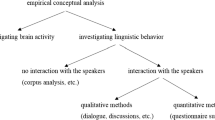Abstract
This essay concerns the question of how we make genuine epistemic progress through conceptual analysis. Our way into this issue will be through consideration of the paradox of analysis. The paradox challenges us to explain how a given statement can make a substantive contribution to our knowledge, even while it purports merely to make explicit what one’s grasp of the concept under scrutiny consists in. The paradox is often treated primarily as a semantic puzzle. However, in “Sect. 1” I argue that the paradox raises a more fundamental epistemic problem, and in “Sects.1 and 2” I argue that semantic proposals—even ones designed to capture the Fregean link between meaning and epistemic significance—fail to resolve that problem. Seeing our way towards a real solution to the paradox requires more than semantics; we also need to understand how the process of analysis can yield justification for accepting a candidate conceptual analysis. I present an account of this process, and explain how it resolves the paradox, in “Sect. 3”. I conclude in “Sect. 4” by considering the implications for the present account concerning the goal of conceptual analysis, and by arguing that the apparent scarcity of short and finite illuminating analyses in philosophically interesting cases provides no grounds for pessimism concerning the possibility of philosophical progress through conceptual analysis.
Similar content being viewed by others
References
Ayer A. J. (1936) Language, truth, and logic. Gollancz, London
Balcerak Jackson, M., & Balcerak Jackson, B. (2011). Understanding and philosophical methodology. Philosophical Studies. doi:10.1007/s11098-011-9729-y.
Block N., Stalnaker R. (1999) Conceptual analysis, dualism and the explanatory gap. The Philosophical Review 108: 1–46
Boghossian P. (2003) Blind reasoning. Aristotelian Society supplementary volume 77: 225–248
Braun D. M. (2002) Cognitive significance, attitude ascriptions, and ways of believing propositions. Philosophical Studies 108: 65–81
Chalmers D. J. (1996) The conscious mind. Oxford University Press, New York
Chalmers D.J. (2002) Does conceivability entail possibility?. In: Gendler T., Hawthorne J. (eds) Conceivability and possibility. Oxford University Press, New York
Chalmers D. J. (2004) Epistemic two-dimensional semantics. Philosophical Studies 18: 153–226
Chalmers D. J. (2009) The two-dimensional argument against materialism. In: McLaughlin B. (ed) Oxford handbook of the philosophy of mind. Oxford University Press, New York
Chalmers D.J. (2011) Propositions and attitude ascriptions: A fregean account. Noûs 45(1): 595–639
Chalmers D.J., Jackson F. (2001) Conceptual analysis and reductive explanation. The Philosophical Review 110: 315–361
Fine, K. (2003a). Moore’s paradox of analysis. Oxford Lecture.
Fine K. (2003b) The limits of abstraction. Oxford University Press, Oxford
Frege, G. (1950). The foundations of arithmetic: A logicomathematical enquiry into the concept of number. Oxford: Blackwell Publishing (translated by J. L. Austin).
Fumerton R. A. (1983) The paradox of analysis. Philosophy and Phenomenological Research 43: 477–497
Fumerton R. A. (2006) Epistemology. Blackwell Publishing, Oxford
Gendler T. Só. (2000) Thought experiments: on the powers and limits of imaginary cases. Garland, New York
Goldman A., Pust J. (1998) Philosophical theory and intuitional evidence. In: DePaul M. R., Ramsey W. (eds) Rethinking intuition: The psychology of intuition and its role in philosophical inquiry. Rowman & Littlefield, Lanham
Huemer M. (2002) Fumerton’s principle of inferential justification. Journal of Philosophical Research 27: 329–340
Jackson F. (1998) From metaphysics to ethics: A defence of conceptual analysis. Oxford University Press, New York
King J. (1996) Structured propositions and sentence structure. Journal of Philosophical Logic 25: 495–521
King J. (1998) What is a philosophical analysis?. Philosophical Studies 90: 155–179
Lipton P. (2000) Inference to the best explanation. In: Newton-Smith W. H. (ed) A companion to the philosophy of science. Blackwell Publishing, Oxford
Ludwg K. (2007) The epistemology of thought experiments: First person versus third person approaches. Midwest Studies in Philosophy 31: 128–159
Moore G. E. (1903) The refutation of idealism. Mind 12: 433–453
Parfit D. (1984) Reasons and persons. Clarendon Press, Oxford
Peacocke C. (2003) Implicit conceptions, understanding, and rationality. In: Hahn M., Ramberg B. (eds) Reflections and replies: Essays on the philosophy of Tyler Burge. MIT Press, Cambridge
Peacocke C. (2004) The realm of reason. Oxford University Press, Oxford
Plato. (1971). Meno. London: Penguin Books (translated by W. K. C. Guthrie).
Salmon N. (1986) Frege’s puzzle. Ridgeview Publishing, Atascadero
Schroeter L. (2004) The limits of conceptual analysis. Pacific Philosophical Quarterly 85: 425–453
Schroeter L. (2006) Against a priori reductions. Philosophical Quarterly 56: 562–586
Soames S. (2005) Reference and description: The case against two-dimensionalism. Princeton University Press, Princeton
Sorensen R. A. (1992) Thought experiments. Oxford University Press, New York
Weatherson B. (2003) What good are counterexamples?. Philosophical Studies 115: 1–31
Williamson T. (2007) The philosophy of philosophy. Oxford University Press, Oxford
Author information
Authors and Affiliations
Corresponding author
Rights and permissions
About this article
Cite this article
Balcerak Jackson, M. Conceptual Analysis and Epistemic Progress. Synthese 190, 3053–3074 (2013). https://doi.org/10.1007/s11229-012-0120-0
Received:
Accepted:
Published:
Issue Date:
DOI: https://doi.org/10.1007/s11229-012-0120-0




